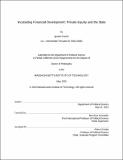| dc.contributor.advisor | Ben Ross Schneider. | en_US |
| dc.contributor.author | Puente, Ignacio. | en_US |
| dc.contributor.other | Massachusetts Institute of Technology. Department of Political Science. | en_US |
| dc.date.accessioned | 2020-11-24T17:32:11Z | |
| dc.date.available | 2020-11-24T17:32:11Z | |
| dc.date.copyright | 2020 | en_US |
| dc.date.issued | 2020 | en_US |
| dc.identifier.uri | https://hdl.handle.net/1721.1/128633 | |
| dc.description | Thesis: Ph. D., Massachusetts Institute of Technology, Department of Political Science, May, 2020 | en_US |
| dc.description | Cataloged from student-submitted PDF version of thesis. | en_US |
| dc.description | Includes bibliographical references (pages 258-271). | en_US |
| dc.description.abstract | This dissertation is motivated by two observations. The first one is that three decades after democratization and liberalization reforms, capital markets in Latin America remain underdeveloped. The second one is the considerable amount of state-related funds behind private equity (PE) investments, both in emerging and developed economies. Combining these two observations and using comparative case analysis to study the emergence of private equity markets, this dissertation proposes a shift in arguments about financial development and corporate governance reform: it emphasizes the role of state-related investors instead of just focusing on the institutional -- political and economic -- | en_US |
| dc.description.abstract | determinants of investment. This dissertation makes three main arguments. First, that private equity investors contribute to the development of financial systems by providing firms with a distinctive source of financing that has no bank-based substitutes. PE investors drive more institutional ownership and corporate governance structures, helping modernize business. Second, that state-related institutional investors play an important role in the emergence of domestic PE markets. Multilateral and domestic development financial institutions have an "incubating" role during the early stages of the PE industry, followed by the involvement of pension funds. And third, it advances a "quiet politics" explanation of the emergence of private equity. It emphasizes the public-private collaboration behind PE industry associations. These associations, in turn, help "co-create" the industry's regulatory framework, operating at the margins of partisan and legislative politics. | en_US |
| dc.description.abstract | Ultimately, this dissertation makes three broad theoretical contributions: (1) it introduces private equity into the development debate; (2) prompts a shift in the discussion on financial development from institutional explanations focused only on rules -- democracy and investor protections -- to actor-based arguments centered on the role of institutional investors, in particular pension funds; and (3) characterizes a novel model of "financial" industrial policymaking. | en_US |
| dc.description.statementofresponsibility | by Ignacio Puente. | en_US |
| dc.format.extent | 271 pages | en_US |
| dc.language.iso | eng | en_US |
| dc.publisher | Massachusetts Institute of Technology | en_US |
| dc.rights | MIT theses may be protected by copyright. Please reuse MIT thesis content according to the MIT Libraries Permissions Policy, which is available through the URL provided. | en_US |
| dc.rights.uri | http://dspace.mit.edu/handle/1721.1/7582 | en_US |
| dc.subject | Political Science. | en_US |
| dc.title | Incubating financial development : private equity and the state | en_US |
| dc.type | Thesis | en_US |
| dc.description.degree | Ph. D. | en_US |
| dc.contributor.department | Massachusetts Institute of Technology. Department of Political Science | en_US |
| dc.identifier.oclc | 1221003679 | en_US |
| dc.description.collection | Ph.D. Massachusetts Institute of Technology, Department of Political Science | en_US |
| dspace.imported | 2020-11-24T17:32:10Z | en_US |
| mit.thesis.degree | Doctoral | en_US |
| mit.thesis.department | PoliSci | en_US |
